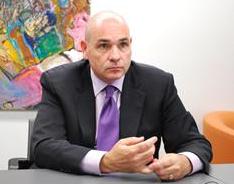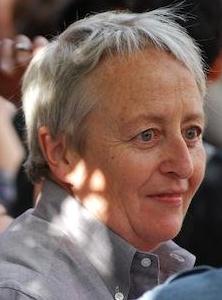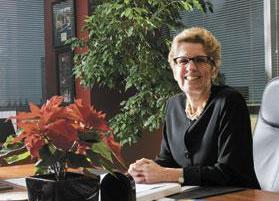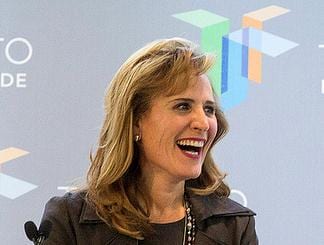
Former MPP George Smitherman predicts Wynne's sexuality would become an election issue if she becomes premier.

Egale's Helen Kennedy says she wants the new premier to have an open door because Egale plans on coming a-knocking.

Kathleen Wynne wants to be Ontario's first female and gay premier.
It’s the year’s biggest celebration of democracy in Ontario, but most readers won’t get much say.
Xtra spoke with three professionals about Friday’s Ontario Liberal leadership convention. Here’s what you need to know.
The convention will decide who will be Ontario’s new premier based on votes from delegates within the Liberal party. Among the group of six candidates, the frontrunners have emerged as two women: Sandra Pupatello, former MPP for Windsor West, and Kathleen Wynne, MPP for Don Valley West.
If Wynne becomes the new leader of the party, she will not only be the first female premier of the province, but also Canada’s first openly gay premier.
The academic: who will win?
Pupatello holds the lead with most supporting delegates, but there are nearly 500 others who have yet to say which way they will vote at this weekend’s convention. Many of those delegates will likely fall under Pupatello’s wing, says Nelson Wiseman, an associate professor of political science at the University of Toronto.
It is during successive ballots where the politics gets tricky. As ballots progress at the convention and contenders fall out of the race, where the delegates of the fallen candidates place their votes is key. Wiseman says Pupatello may still come out on top, not because of her pre-convention delegate lead, but for her business-oriented platform. Wiseman predicts the business-oriented supporters of other candidates may switch to Pupatello over Wynne.
The four male candidates are former Parkdale-High Park MP and MPP Gerard Kennedy, and MPPs Charles Sousa (Mississauga South), Eric Hoskins (St. Paul’s), and Harinder Takhar (Mississauga-Erindale).
The politician: what they will face
First, the new Premier will likely face the ongoing turmoil in the province’s education system, despite the Jan 23 repeal of Bill 115. But what about school-related issues facing the LGBT community like funding for Catholic schools?
“For the Liberal Party, there’s a deep history of advocacy in favour of such funding,” says former MPP, mayoral candidate and openly gay politician, George Smitherman. Though Wynne has said she will not address the funding of the Catholic School Board if elected premier, Smitherman expects the issue will have its time “before too long.”
On the more personal side of politics, as the country’s first openly gay premier, Wynne could face some struggles in office if she wins, says Smitherman.
“We can anticipate that if Kathleen Wynne is elected and is the new premier of Ontario that there will be some effort to use her sexual orientation as a negative wedge, or wedge to get people to work against her,” he says.
Smitherman speaks from experience, reflecting on his time running for mayor of Toronto in 2010. As an openly gay candidate, he faced resistance from the “philosophically conservative” politicians.
The advocate: what we need from them
The potential for a openly lesbian premier is exciting and important, says Helen Kennedy, executive director of Egale Canada.
“The message that sends to our youth in particular, not only in Ontario but across the country, is very significant of so many levels,” she says. “It’s a big deal. I think that it’s great to see her in this position going into the weekend.”
Regardless of who the winner is, Kennedy wants the new premier to have an open door.
“I think one of the most important things that we need is a place at the table and an opportunity to meet with and have access to the people that are making key decisions around LGBT education, health care, housing, access for trans people,” says Kennedy.
“But before we get to the list of things that we need as a community and the priorities of the community, we need to have access to the discussion and we need to be invited in to have that discussion,” she says.
As the new government faces a crowded doorstep after this weekend’s convention, Kennedy says Egale will be one of the first to knock.
“We’ll be knocking just as hard as everyone else, in some cases maybe harder.”

 Why you can trust Xtra
Why you can trust Xtra


